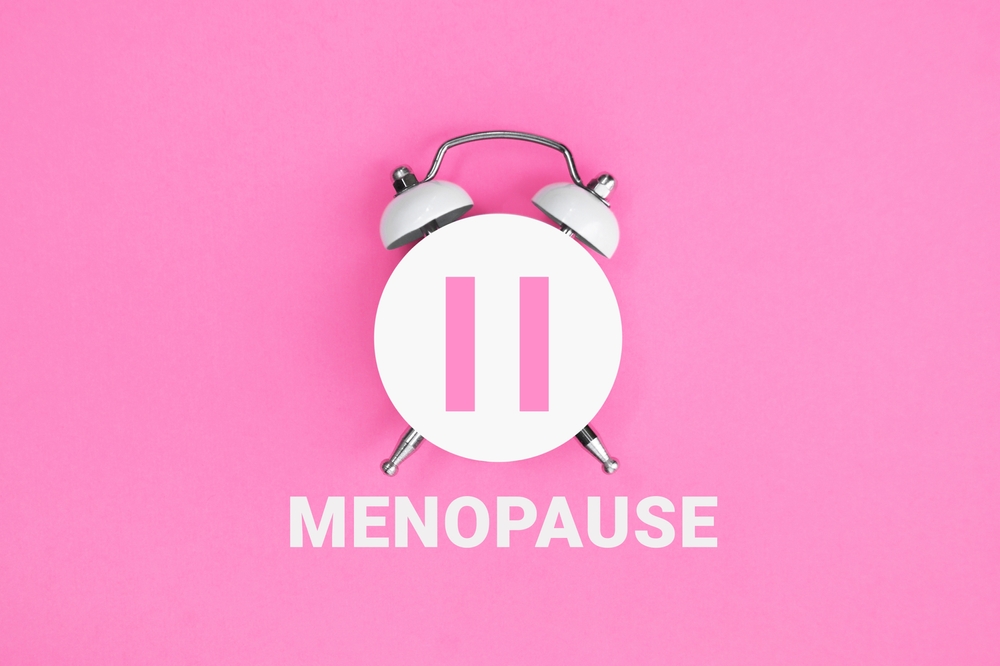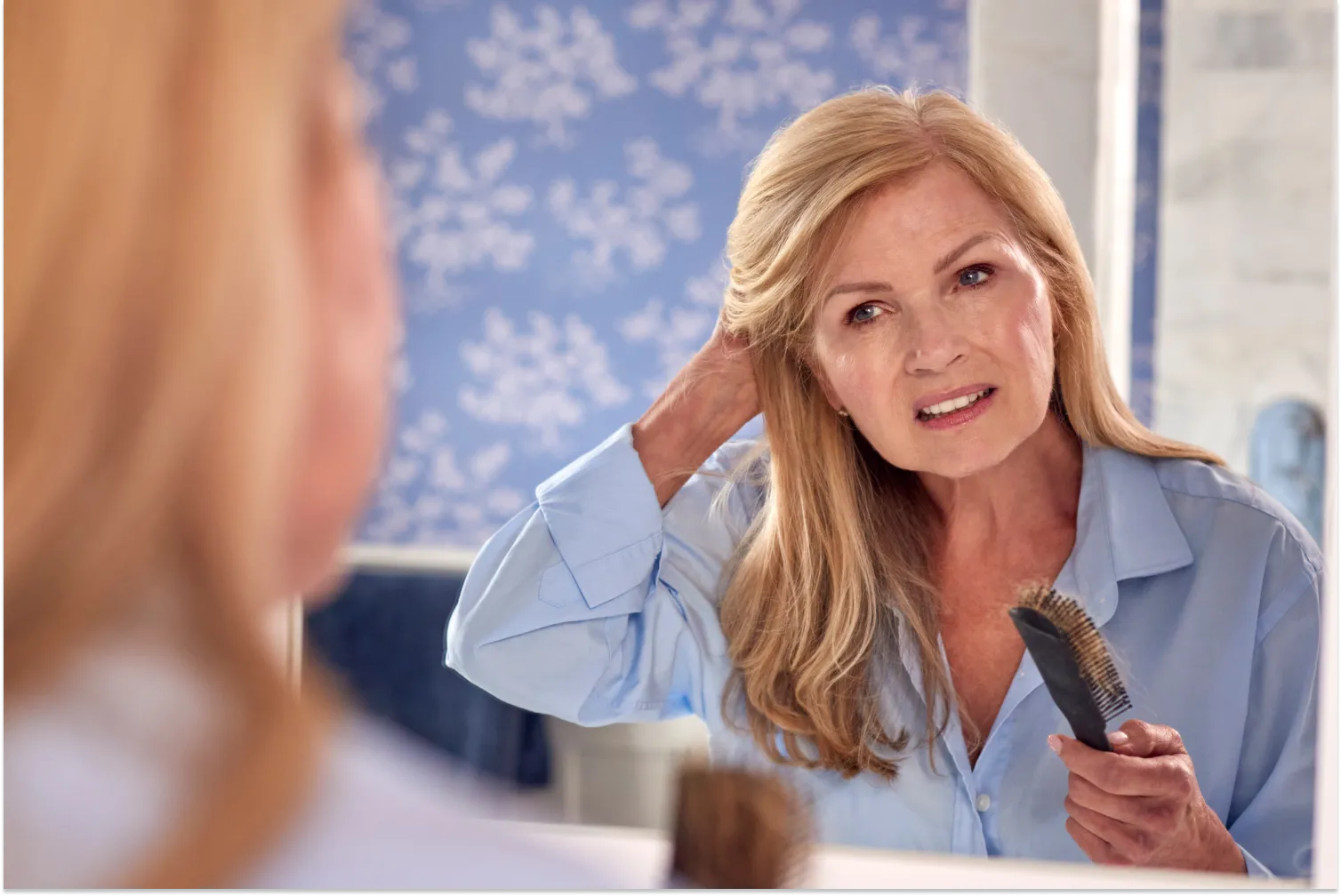Quick Summary:
- Perimenopause And Menopause Are Natural Occurrences In A Woman's Life: Natural hormonal shifts affect the body in many ways, including sleep regulation.
- Menopausal Insomnia Is Different Than Occasional Bad Sleep: Symptoms include trouble falling asleep, night sweats, and racing thoughts at night.
- Other Physical Changes Often Accompany: Weight gain, joint pain, an increased risk of sleep apnea, and bladder changes often exacerbate menopausal insomnia.
- Poor Sleep Affects Hormones And Mood: Poor sleep can lead to feeling “off.â€
- Certain Lifestyle Strategies Can Help: Daytime exercise, mindfulness exercises, and a sleep routine can help improve your sleep quality.
- When To Talk To A Doctor: If symptoms are disrupting your quality of life, then a doctor can educate you on different options, including natural remedies and supplements.
If you're in your 40s or 50s and suddenly finding it harder to fall asleep, or stay asleep, you're not imagining things.
Hormonal changes during perimenopause and menopause can wreak havoc on your sleep, and leave you tossing, turning, sweating, or waking up before the sun. You're not alone, and you're definitely not the only one Googling “menopausal insomnia†at 3 AM.
In this article, we'll break down how menopause and perimenopause affect your sleep, why it happens, and what you can actually do about it.

The Menopausal Transition: Everything You Need To Know
Before we dive into how menopause and perimenopause impact your sleep, it helps to understand what's actually happening in your body during this time.
Perimenopause [1] is the phase leading up to menopause, and it can start as early as your late 30s or early 40s. During this time, your ovaries gradually produce less estrogen and progesterone, the two main female hormones that regulate everything from your menstrual cycle to your mood to, you guessed it, your sleep.
Perimenopause can last anywhere from a few months to over a decade. Many women experience irregular periods, mood swings, hot flashes, and yes, trouble sleeping.
Menopause [2] is officially defined as the point when you haven't had a period for 12 consecutive months. For most women, this happens between the ages of 45 and 55. After that, you're considered postmenopausal. But the symptoms don't always stop there. Many women continue to experience things like night sweats or insomnia well into postmenopause.
The key thing to know is this: Your body is going through a major hormonal shift, and those changes don't just affect your reproductive system. Estrogen, for example, plays a big role in regulating body temperature, maintaining healthy serotonin levels, and supporting deep sleep cycles. So, when your estrogen levels start to dip and fluctuate, it's no surprise your sleep can take a hit.
Progesterone, another hormone that declines during perimenopause, is also important for sleep. It has a calming, sleep-promoting effect, some even call it the body's natural sleep aid. When progesterone drops, you may notice it's harder to fall asleep or stay asleep.
What Sleep Problems Look Like During Perimenopause And Menopause
Here are some of the most common sleep problems women experience during this transition:
- Trouble falling asleep
- Waking up in the middle of the night
- Early morning awakenings
- Night sweats and hot flashes
- Increased anxiety or racing thoughts at night
Is It a Bad Night's Sleep or Menopausal Insomnia?
Everyone has the occasional rough night, but menopausal insomnia is different. It's not just one or two bad nights a month. It's a pattern. If you're consistently struggling to fall asleep, stay asleep, or wake up feeling rested, and it's affecting your mood, focus, or quality of life, you may be dealing with true menopausal insomnia.
This kind of insomnia can be relentless and draining, especially when it's compounded by other symptoms like hot flashes, anxiety, or mood swings. And the kicker? The more stressed you are about not sleeping, the harder it becomes to actually get the rest you need.
The good news is that you're not stuck. Understanding what's behind these sleep disruptions is the first step toward getting back to better nights, and better days.
Why Menopause and Perimenopause Disrupt Sleep
As we've already touched up, your body goes through a lot during perimenopause and menopause. But the longer answer? A combination of shifting hormones, physical symptoms, and emotional changes are working together to make sleep harder than it used to be.
Let's break down the biggest culprits.
Hormonal Changes
Hormones are the foundation of many systems in the body, including sleep, and during perimenopause and menopause, those hormones fluctuate wildly before eventually declining. The two biggest players [3] here are estrogen and progesterone.
Estrogen helps regulate your body temperature, influences your circadian rhythm, and plays a role in keeping serotonin and other “feel-good†brain chemicals in balance. When estrogen levels drop, your ability to maintain a stable body temperature at night can suffer (cue the night sweats), and your sleep cycle can become less predictable.
Meanwhile, progesterone is a natural sedative, it has a calming effect on the brain and helps promote deeper sleep. As progesterone decreases, you may notice it's harder to relax, fall asleep, or stay asleep through the night. You're not just imagining that uptick in middle-of-the-night wakeups or restless tossing.
Together, these hormonal shifts can throw off REM sleep (the dream stage of sleep) and deep sleep, the stages most responsible for leaving you feeling refreshed. As those stages get interrupted, even a full 7 or 8 hours can leave you feeling exhausted.
Hot Flashes and Night Sweats
One of the hallmark symptoms of menopause is the hot flash, a sudden, intense feeling of heat that can spread through your body, often accompanied by sweating, a rapid heartbeat, and flushing. When this happens at night, it's called a night sweat, and it can fully or partially wake you up.
These are technically called vasomotor symptoms, caused by a misfire in the brain's temperature-regulation center. Because estrogen helps regulate that system, falling levels make it more sensitive, so even minor temperature changes can trigger a hot flash.
At night, your body naturally lowers its core temperature to help you fall and stay asleep. But if you're dealing with menopause-related temperature instability, this process gets interrupted. You may fall asleep just fine, but as soon as your internal thermostat misfires, a hot flash wakes you up, sometimes multiple times a night. Getting back to sleep after each episode can be tough, especially when your sheets and pajamas are soaked.
Mood and Mental Health Shifts
The hormonal changes of menopause also influence your mood and mental health, which can feed into sleep issues.
Estrogen has a strong link to the regulation of mood-related neurotransmitters like serotonin and dopamine. As levels dip, you may find yourself more prone to anxiety, irritability, or even depression, all of which can make it harder to wind down at night.
Anxiety is especially tricky. Racing thoughts, overthinking, and nighttime worry can keep you up for hours or wake you up in the middle of the night with a pounding heart. The worst part? Anxiety about not sleeping often becomes part of the cycle. You go to bed nervous that you won't sleep again, and that anxiety becomes a self-fulfilling prophecy.
Lifestyle Changes That Help With Menopausal Insomnia
When menopause or perimenopause starts messing with your sleep, it can feel overwhelming. But there are practical, friendly ways to take back control and create a more peaceful path to rest. While there's no one-size-fits-all fix, even small changes can add up to better nights (and better days).
Here are some tried-and-true strategies to support your sleep during this transition:
Create a Sleep-Conducive Environment
Your bedroom should be your sleep sanctuary. A few simple tweaks can go a long way in helping your body and mind relax at bedtime.
- Keep it cool: Since night sweats and hot flashes are common, aim for a cooler room temperature: around 60 to 67 degrees Fahrenheit is ideal.
- Dark and quiet: Light disrupts melatonin, the hormone that helps you sleep. Use blackout curtains or an eye mask, and try earplugs or a white noise machine if noise is an issue.
- Breathable fabrics: Choose lightweight, moisture-wicking fabrics for your pajamas and bedding. Natural fibers like cotton or bamboo can help you stay comfortable if you tend to overheat.
Wind Down With a Routine
Your brain loves predictability. A calming wind-down routine tells your body, “Hey, it's time to sleep.†Over time, these habits become cues that help you drift off more easily.
- Start about 30-60 minutes before bed and do the same activities in the same order.
- Ideas to try:
- A warm bath or shower (which helps drop your core body temp after)
- Light stretching or gentle yoga
- Listening to soothing music
- Reading a book (preferably paper, and not a backlit screen)
- Avoid screens: Phones and tablets emit blue light, which can mess with your sleep cycle. Try putting your phone away an hour before bed.
Mind What You Eat and Drink
What goes into your body during the day, and especially in the evening, has a direct effect on how well you sleep.
- Cut back on caffeine and alcohol: Even if you feel like caffeine doesn't affect you, it can disrupt your ability to fall into deep sleep. And alcohol, though it might make you sleepy at first, often leads to nighttime wakeups and less restful rest.
- Avoid sugar and heavy meals before bed: These can cause energy spikes, indigestion, and even night sweats. If you're hungry before bed, opt for something light and balanced, like yogurt or a banana with almond butter.
- Stay hydrated but earlier: Drink plenty of water throughout the day to avoid dehydration, which can affect your sleep, but cut back a couple of hours before bed to reduce nighttime bathroom trips.
Move Your Body
Regular movement during the day helps regulate your circadian rhythm, reduces anxiety, and supports deeper sleep.
- Aim for daily exercise: Even just 20-30 minutes of walking, swimming, or dancing can improve sleep and boost mood.
- But avoid intense workouts too close to bedtime: These can rev you up instead of winding you down.
- Try gentle stretching in the evening: Slow yoga or a few minutes of stretching can ease muscle tension and help your body prepare for rest.
Manage Stress and Anxiety
An anxious mind is one of the biggest barriers to restful sleep, and during perimenopause and menopause, emotional shifts can make it even harder to quiet your thoughts. Finding ways to ease stress before bed can make a big difference.
- Mindfulness or meditation: Even 5-10 minutes of deep breathing or a guided meditation can slow your thoughts and bring you into the present moment.
- Journaling: Try writing down worries, to-dos, or thoughts swirling in your brain before bed. Getting them out on paper can reduce mental clutter.
- CBT-I (Cognitive Behavioral Therapy for Insomnia) [4]: This is a structured, evidence-based approach that helps retrain your brain for better sleep. If sleep struggles are persistent, CBT-I is a highly effective, non-medication-based option to consider, with many therapists now offering it virtually.
There's no quick fix for menopausal or perimenopausal sleep issues, but you do have tools. Think of these changes as part of a supportive routine, not another task list. Even one or two tweaks can lead to better nights and more energy to enjoy your days.

Medical and Supplement Options
While lifestyle changes can go a long way in improving sleep, sometimes they're not quite enough. If your sleep struggles are persistent or significantly affecting your daily life, it may be time to explore medical or supplemental options.
Remember: There's no shame in getting extra support. Your rest and well-being matter.
Hormone Replacement Therapy (HRT)
Hormone Replacement Therapy is one of the most well-known treatments for menopausal symptoms, including sleep disturbances.
It typically involves supplementing the body with estrogen, sometimes combined with progesterone. Because dropping hormone levels are a big driver of sleep issues, replenishing those hormones can help regulate body temperature, reduce hot flashes, and support mood, all of which can lead to better sleep.
Non-Hormonal Prescription Options
If HRT isn't right for you or you prefer not to take hormones, there are other prescription options that may help, especially if mood symptoms like anxiety or depression are part of the sleep puzzle.
- Sleep aids: In some cases, doctors may prescribe short-term sleep medications to help break a cycle of insomnia. These can help you fall asleep or stay asleep, but they're typically used cautiously and not meant for long-term use.
- SSRIs Or SNRIs: These are types of antidepressants that can also help manage anxiety or depression, which are often linked with menopausal insomnia. Some options, like low-dose paroxetine, are specifically approved for treating hot flashes and may have a dual benefit for mood and sleep.
Non-hormonal medications work differently for each person, and they may come with side effects. A healthcare provider can help guide you through the options, weigh pros and cons, and monitor how well they're working.
Natural Remedies and Supplements
Plenty of people turn to natural or over-the-counter options for sleep support. Although “natural†doesn't always mean it's safe or effective, some remedies, like melatonin, magnesium, and valerian root, may be worth discussing with your doctor:
Final Thoughts
If menopause or perimenopause is stealing your sleep, you're not alone, and you're not stuck. With a mix of practical strategies, medical support, and a little self-compassion, better rest is possible. For more resources, guidance, and support tailored to your journey, visit Fem Excel.
References:
[1] Santoro N. Perimenopause: From Research to Practice. J Womens Health (Larchmt). 2016 Apr;25(4):332-9. doi: 10.1089/jwh.2015.5556. Epub 2015 Dec 10. PMID: 26653408; PMCID: PMC4834516.
[2] Peacock K, Carlson K, Ketvertis KM. Menopause. [Updated 2023 Dec 21]. In: StatPearls [Internet]. Treasure Island (FL): StatPearls Publishing; 2025 Jan-. Available from: https://www.ncbi.nlm.nih.gov/books/NBK507826/#
[3] Haufe A, Leeners B. Sleep Disturbances Across a Woman's Lifespan: What Is the Role of Reproductive Hormones? J Endocr Soc. 2023 Mar 15;7(5):bvad036. doi: 10.1210/jendso/bvad036. PMID: 37091307; PMCID: PMC10117379.
[4] Rossman J. Cognitive-Behavioral Therapy for Insomnia: An Effective and Underutilized Treatment for Insomnia. Am J Lifestyle Med. 2019 Aug 12;13(6):544-547. doi: 10.1177/1559827619867677. PMID: 31662718; PMCID: PMC6796223.






